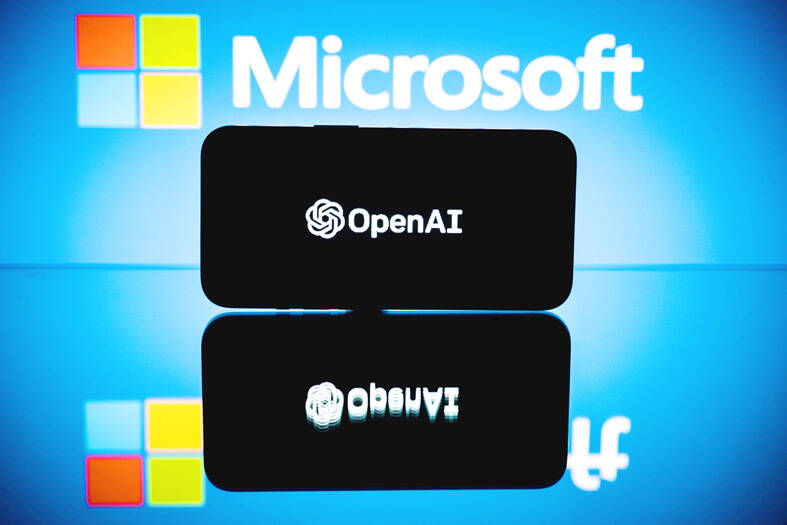Microsoft Corp has threatened to cut off access to its Internet search data, which it licenses to rival search engines, if they do not stop using it as the basis for their own artificial intelligence (AI) chat products, people familiar with the dispute have said.
The software maker licenses the data in its Bing search index — a map of the Internet that can be quickly scanned in real time — to other companies that offer Web search, such as Apollo Global Management Inc’s Yahoo and DuckDuckGo.
Last month, Microsoft integrated a cousin of ChatGPT, OpenAI’s AI-powered chat technology, into Bing.

Photo: AFP
Rivals quickly moved to roll out their own AI chatbots as hype built around the technology. Last week, Alphabet Inc’s Google publicly released Bard, its conversational AI product. DuckDuckGo, a search engine that emphasizes privacy, introduced DuckAssist, a feature that uses AI to summarize answers to search queries. You.com and Neeva Inc — two newer search engines that debuted in 2021 — have also debuted AI-powered search services, YouChat and NeevaAI.
These search chatbots aim to combine the conversational skills of ChatGPT with the information provided by a conventional search engine. DuckDuckGo, You.com and Neeva’s regular search engines all use Bing to provide some of their information, because indexing the entire Web is costly — it requires servers to store data and a constant crawl of the Internet to incorporate updates. It would be similarly complex and pricey to get together that data for a search chatbot.
Microsoft has told at least two customers that using its Bing search index to feed their AI chat tools violates the terms of their contract, said the people, who spoke anonymously because they were discussing a confidential dispute.
The Redmond, Washington-based technology company said it may terminate the licenses providing access to its search index, the people said.
“We’ve been in touch with partners who are out of compliance as we continue to consistently enforce our terms across the board,” Microsoft said in a statement. “We’ll continue to work with them directly and provide any information needed to find a path forward.”
If they were cut off from Microsoft’s index, smaller search engines would have a hard time finding an alternative. Microsoft and Google are the only two companies that index the entire Web, and Google’s limitations on the use of its index have led nearly all other search engines to use Bing.

The US dollar was trading at NT$29.7 at 10am today on the Taipei Foreign Exchange, as the New Taiwan dollar gained NT$1.364 from the previous close last week. The NT dollar continued to rise today, after surging 3.07 percent on Friday. After opening at NT$30.91, the NT dollar gained more than NT$1 in just 15 minutes, briefly passing the NT$30 mark. Before the US Department of the Treasury's semi-annual currency report came out, expectations that the NT dollar would keep rising were already building. The NT dollar on Friday closed at NT$31.064, up by NT$0.953 — a 3.07 percent single-day gain. Today,

‘SHORT TERM’: The local currency would likely remain strong in the near term, driven by anticipated US trade pressure, capital inflows and expectations of a US Fed rate cut The US dollar is expected to fall below NT$30 in the near term, as traders anticipate increased pressure from Washington for Taiwan to allow the New Taiwan dollar to appreciate, Cathay United Bank (國泰世華銀行) chief economist Lin Chi-chao (林啟超) said. Following a sharp drop in the greenback against the NT dollar on Friday, Lin told the Central News Agency that the local currency is likely to remain strong in the short term, driven in part by market psychology surrounding anticipated US policy pressure. On Friday, the US dollar fell NT$0.953, or 3.07 percent, closing at NT$31.064 — its lowest level since Jan.

The New Taiwan dollar and Taiwanese stocks surged on signs that trade tensions between the world’s top two economies might start easing and as US tech earnings boosted the outlook of the nation’s semiconductor exports. The NT dollar strengthened as much as 3.8 percent versus the US dollar to 30.815, the biggest intraday gain since January 2011, closing at NT$31.064. The benchmark TAIEX jumped 2.73 percent to outperform the region’s equity gauges. Outlook for global trade improved after China said it is assessing possible trade talks with the US, providing a boost for the nation’s currency and shares. As the NT dollar

The Financial Supervisory Commission (FSC) yesterday met with some of the nation’s largest insurance companies as a skyrocketing New Taiwan dollar piles pressure on their hundreds of billions of dollars in US bond investments. The commission has asked some life insurance firms, among the biggest Asian holders of US debt, to discuss how the rapidly strengthening NT dollar has impacted their operations, people familiar with the matter said. The meeting took place as the NT dollar jumped as much as 5 percent yesterday, its biggest intraday gain in more than three decades. The local currency surged as exporters rushed to